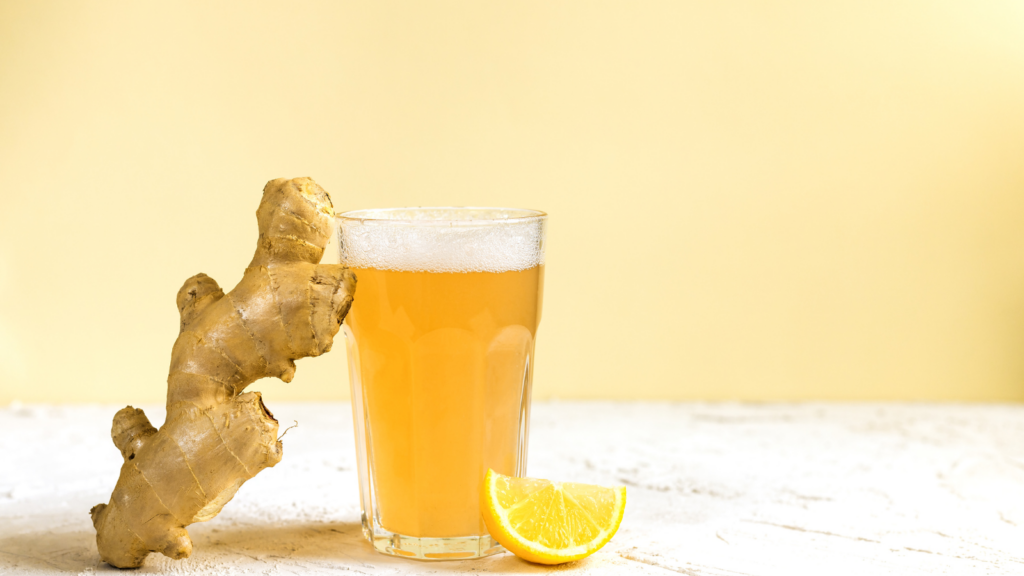Key Takeaways
- Low-Calorie Choice: Diet ginger ale contains 0 calories per 12 fl oz serving, making it an excellent option for those looking to cut caloric intake.
- No Sugars or Carbs: With 0 grams of sugars and carbohydrates, it appeals to individuals following low-sugar or low-carbohydrate diets.
- Artificial Sweeteners: The drink uses artificial sweeteners like aspartame or sucralose for sweetness, which can cause gastrointestinal discomfort or cravings for some individuals.
- Sodium Content: Each serving contains 30 mg of sodium, which may be a consideration for those monitoring their sodium intake due to health conditions.
- Hydration Benefits: The carbonated water in diet ginger ale provides a refreshing way to stay hydrated while enjoying a fizzy beverage.
- Nutritional Limitations: Diet ginger ale lacks essential nutrients, and regular consumption may lead to reliance on artificially flavored drinks instead of healthier options.
Diet ginger ale is a popular choice for those seeking a refreshing beverage without the calories. With its crisp taste and hint of spice, it’s often seen as a guilt-free alternative to regular soda. But how does it stack up nutritionally? Understanding the nutrition facts behind diet ginger ale can help individuals make informed choices about their beverage consumption.
But how does it stack up nutritionally? Understanding the nutrition facts behind diet ginger ale can help individuals make informed choices about their beverage consumption.
While it may seem harmless, diet ginger ale contains artificial sweeteners and other additives that can impact health. Exploring its ingredients and nutritional content reveals important information about sugar substitutes, calories, and potential health effects. For those curious about the benefits and drawbacks of this fizzy drink, diving into the nutrition facts can provide clarity on whether it truly fits into a balanced diet.
Diet Ginger Ale Nutrition Facts
Diet ginger ale serves as a low-calorie beverage option, often chosen for its distinct flavor and effervescence. The primary ingredients typically include carbonated water, citric acid, and natural or artificial ginger flavor. Artificial sweeteners like aspartame or sucralose replace sugar, greatly reducing calorie content.
Nutritional Information
Diet ginger ale generally contains:
| Nutrient | Amount per 12 fl oz (355 mL) |
|---|---|
| Calories | 0 |
| Total Fat | 0 g |
| Sodium | 30 mg |
| Total Carbohydrates | 0 g |
| Sugars | 0 g |
| Protein | 0 g |
The absence of calories and sugars makes diet ginger ale appealing for those monitoring their caloric intake. However, it’s crucial to consider the impact of artificial sweeteners on health, particularly for individuals with certain sensitivities or dietary restrictions.
Health Considerations
Diet ginger ale contains no fat, making it suitable for low-fat diets. The presence of sodium may contribute to daily intake limits for individuals monitoring blood pressure. While its flavor can provide satisfaction without added calories, habitual consumption of artificially sweetened beverages may pose health concerns over time, including impacts on gut health and cravings for sweetness.
Understanding these components helps consumers make informed choices regarding diet ginger ale as a dietary component. Its role can be both recreational and functional within various dietary frameworks.
Nutritional Profile
Diet ginger ale offers a low-calorie beverage option with specific nutritional components worth noting. Understanding these details aids in informed dietary choices.
Calories
Diet ginger ale contains 0 calories per 12 fl oz (355 mL). This absence of caloric content makes it a favorable choice for individuals aiming to reduce their caloric intake while looking for a refreshing beverage.
Carbohydrates
Diet ginger ale includes 0 grams of carbohydrates per 12 fl oz (355 mL). This characteristic is particularly appealing for those following low-carbohydrate diets, allowing enjoyment of a fizzy drink without affecting carbohydrate counts.
Sugars
Diet ginger ale registers at 0 grams of sugars per 12 fl oz (355 mL). The use of artificial sweeteners replaces sugar, delivering sweetness without contributing to sugar intake, which is beneficial for maintaining blood sugar levels.
Sodium
Diet ginger ale contains 30 mg of sodium per 12 fl oz (355 mL). While this amount is relatively low, it may concern those monitoring sodium intake due to dietary restrictions or health conditions, such as hypertension.
Health Benefits
Diet ginger ale offers various health benefits that make it a popular choice among low-calorie beverages. Understanding these advantages helps individuals make informed dietary decisions.
Hydration
Hydration plays a vital role in overall health. Carbonated water in diet ginger ale provides a refreshing way to stay hydrated while enjoying a fizzy beverage. Staying hydrated supports bodily functions, including digestion and circulation. Although diet ginger ale contains sodium, its contribution is minimal, allowing for hydration without excessive intake of salts.
Low-Calorie Option
Diet ginger ale serves as a low-calorie alternative to regular sodas. With 0 calories per 12 fl oz (355 mL), it satisfies cravings for sweetness and carbonation without adding to daily caloric intake. This feature makes it appealing for those managing weight, as it allows for enjoyable consumption without the guilt associated with higher-calorie drinks. The absence of sugars and carbohydrates further enhances its status as a suitable option for individuals pursuing low-calorie diets or controlling blood sugar levels.
Potential Drawbacks
Diet ginger ale, while a low-calorie beverage, carries certain drawbacks related to its ingredients and effects on health. It’s essential to consider these potential issues when including it in a diet.
Artificial Sweeteners
Diet ginger ale often contains artificial sweeteners such as aspartame or sucralose. These sweeteners provide a sweet taste without calories but can contribute to unwanted health effects. Some individuals experience gastrointestinal discomfort, headaches, or sugar cravings when consuming these substitutes. Long-term consumption of artificial sweeteners has raised concerns about possible links to metabolic disorders and altered gut microbiota. Individuals with sensitivities should approach diet ginger ale with caution.
Impact on Health
Although diet ginger ale is calorie-free, its sodium content can impact health. A typical serving has 30 mg of sodium. While this amount is low, individuals on sodium-restricted diets or those with high blood pressure should monitor their intake. Additionally, the absence of essential nutrients means that diet ginger ale does not contribute to nutritional needs. Regular consumption may lead to reliance on sugary flavors, detracting from healthier beverage options. Understanding these impacts is crucial for making well-informed beverage choices.
Caloric Intake
Diet ginger ale offers a refreshing and low-calorie alternative to traditional sodas. It satisfies sweet cravings while keeping caloric intake in check. However, it’s essential to be aware of the potential health impacts of artificial sweeteners and sodium content.
However, it’s essential to be aware of the potential health impacts of artificial sweeteners and sodium content.
For those monitoring their weight or blood sugar levels, diet ginger ale can be a suitable choice. Yet, moderation is key. Regular consumption should be balanced with a variety of healthier beverage options to meet nutritional needs. Understanding these factors will empower consumers to make informed decisions about incorporating diet ginger ale into their lifestyle.



